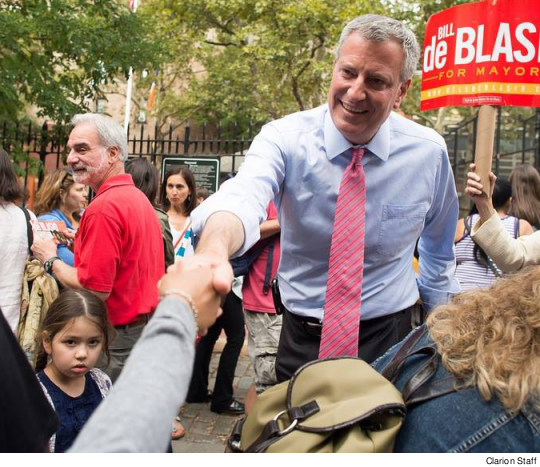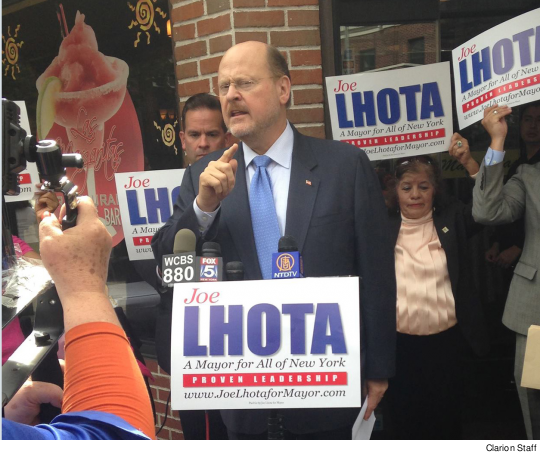A recent article in the Daily News detailed Democratic mayoral candidate Bill de Blasio’s proposals for addressing New York City’s severe income inequality. “He took aim at the Bloomberg administration’s recent deal with food provider Fresh Direct,” the News reported. “De Blasio insisted the money could have been better spent. Instead of giving big companies subsidies, he suggested using the money to fund the City University of New York, which has had its budget slashed by a third over the past two decades.”
 |
Funding for CUNY has emerged as a prominent issue in this year’s mayoral election. That’s due mainly to de Blasio’s emphasis on making the city work better for the poor and middle class, and his vision of CUNY’s role in that process. A PSC statement on the union’s endorsement of de Blasio in June cited “his strategic vision for CUNY and his focus on ending economic inequality” as central factors.
De Blasio’s main rival, Republican Joe Lhota, has addressed some CUNY issues in his policy proposals. But Lhota has given City University far less emphasis than de Blasio, despite the fact that Lhota is a CUNY trustee. In fact, Lhota’s 12 years as a trustee are not mentioned in the biography on his campaign website.
De Blasio’s Plan
De Blasio says the City gives too many tax breaks to “large, well-connected corporations” and that these subsidies are not an effective way to build good jobs at good wages: the $130 million break that Bloomberg has given to Fresh Direct is a prominent example. Instead, the Democratic candidate calls for strengthening New York City’s economy at its base. He would redirect funds from large corporate tax breaks to expand City support for CUNY and to provide loans to small businesses, which de Blasio contends are a more effective generator of jobs.
Instead of “hundreds of millions of dollars to office towers on Park Avenue and unaccountable, one-shot subsidies to companies who can do without them,” de Blasio says, these City funds should go “to reinvest in real paths to economic opportunity, like our sorely underfunded CUNY system.” Redirecting some of these funds would pay for a 50% rise the City’s funding of CUNY – a significant increase. (New York City currently provides about one-third of CUNY’s public support, while about two-thirds comes from the State.)
As noted in the Daily News article, de Blasio puts his CUNY funding proposal in the context of the accumulated damage from past budget cuts. “Decades of State and City disinvestment have undermined CUNY’s historic role as a stepping-stone to the middle class for more than a generation of working-class youth,” he told Clarion in August. “We need to put CUNY on a more solid budgetary footing to make sure it can provide high-quality and affordable higher education for all New Yorkers.”
De Blasio’s proposal for increased CUNY funding is a central part of his overall economic development plan. In a policy speech at the New School in May, he noted that high-tech and health care, “the two fastest-growing sectors of New York City’s economy, are dominated by workers who aren’t from New York.” In response, de Blasio says he wants to “strengthen CUNY programs that can bring underrepresented populations into technology and other key, high-paying sectors of the New York economy.”
That means helping CUNY “expand critical programs, particularly those focused on ‘middle skill’ science, technology, engineering and math (STEM) training,” de Blasio told Clarion, and he backs a proposal by Scott Stringer, the PSC-endorsed Democratic candidate for comptroller, along these lines. “Our goal should be that within eight years, the majority of skilled technology-related jobs in New York City are hiring people educated in New York City,” de Blasio says. “I want to restore CUNY as the central gateway to a quality education and a good job in NYC.”
Part of making that happen, de Blasio says, is restraining the growth of CUNY tuition. An important goal of increasing City support for the system, he says, is “to make CUNY affordable again.”
Lhota’s Views
In the economic policy proposal he developed for the mayoral campaign, Republican Joe Lhota says that “we need to lower the barriers to a quality higher education and invest in our City University system.” Unlike de Blasio, however, he does not commit to increasing the City’s CUNY funding, nor does he discuss particular budget figures.
Since Lhota first became a CUNY trustee in 2001, he has voted to approve tuition increases that raised senior college tuition from $3,200 to $5,730 per year. He also supported tuition hikes at the community colleges, which raised the annual price tag from $2,500 to $4,200.
“My academic future is uncertain and that scares me,” a Brooklyn College senior told Clarion after Lhota and other trustees approved an $800 increase in 2003. “With only six classes left, I don’t know if I can afford to finish my degree.”
 |
A former New York City budget director and former Commissioner of Finance, Lhota has chaired the Board of Trustees’ Committee on Fiscal Affairs since shortly after he joined the Board. On his watch, the proportion of CUNY’s operating budget that comes from student tuition has steadily climbed. Lhota has been an advocate for CUNY’s current tuition plan, which provides for five years of automatic annual increases, for a total tuition hike of $1500.
Lhota’s policy book includes support for expanding some specific CUNY programs, though no sources of increased funding are discussed. Lhota also points to NYC’s growing technology sector as a source of better-paying jobs, and proposes that CUNY “create a small business/technology business taskforce” that can consider how to “adapt the CUNY system to the needs of local employers so as to produce the best-trained workers for local businesses.”
“New York City relies too heavily on finance, insurance and real estate (FIRE) for jobs and tax revenue,” Lhota’s policy book contends, and he proposed building on “the spectacular growth in tourism” as one path to greater economic diversity. Here Lhota envisions an expanded role for CUNY, proposing creation of “a flagship CUNY Hospitality Management School incorporating both the senior and community college level,” and seeking “active cooperation of New York City hospitality industry leaders” in developing the new school. Lhota’s plan does not specify how this proposed new school would relate to existing CUNY programs, such as the well-known hospitality management program at City Tech.
Lhota’s economic plan also includes promises to “create a tech campus in every borough, beginning on Staten Island,” and to “establish free online community college programs.” These proposals are not further described, and it is unclear whether the online courses he envisions would be for-credit, or how they would relate to earning a degree. The Lhota campaign did not return calls requesting comment.
Pathways
Bill de Blasio has voiced some concerns about Pathways, CUNY’s overhaul of its general education curriculum. Pointing to the 92% “no confidence” vote in Pathways among CUNY’s full-time faculty in a referendum last May, de Blasio said that the Pathways plan needs another look. “As mayor, I would take additional steps to evaluate the effectiveness of a curriculum that has been rejected so dramatically by faculty,” he said this summer. “The experience and training that faculty members bring to their profession must be taken into consideration during curriculum development, or we risk sacrificing the academic quality of our city’s institutions.”
As a CUNY trustee, Joe Lhota voted for the administration’s resolution creating the Pathways plan, and has supported its implementation since. When the PSC wrote to CUNY’s trustees about the results of the no-confidence vote, Board Chair Benno Schmidt replied with a short two-paragraph note referencing an earlier letter by then-Chancellor Matthew Goldstein. Lhota, like other trustees, did not individually respond.
Petraeus
When press reports revealed that former General David Petraeus had been hired by CUNY at a salary of $150,000 per year to teach a single seminar (an amount that Petraeus reduced to $1 after the controversy exploded), de Blasio was sharply critical of the move. He joined other elected officials such as City Councilmember Brad Lander, a Democrat, and Assemblymember Kieran Lalor, a Republican, in criticizing CUNY’s decision.
“The salary offered to Gen. Petraeus is dramatically out-of-step with CUNY professors in similar arrangements,” de Blasio wrote in a letter to Interim Chancellor William Kelly. “According to the American Association of University Professors, many adjunct CUNY professors would earn approximately $3,000 to instruct a similarly structured three-hour course during a semester.” De Blasio urged Kelly to renegotiate the arrangement with Petraeus, and redirect the funds toward “resources that will better serve CUNY students.”
To offer such an outsized salary to Petraeus when “many New Yorkers are struggling to afford higher education” is “symptomatic of what’s gone wrong in higher education,” de Blasio later said.
Lhota chaired the Board of Trustees’ Committee on Fiscal Affairs throughout the Petraeus controversy. Minutes of the committee and the board do not indicate that he asked any questions about the salary offered to Petraeus, though he could possibly have done so when the Board met in executive session. Lhota has not spoken publicly on the Petraeus hire.
BEYOND NOVEMBER
During this mayoral campaign, CUNY issues have received a new level of attention in citywide political discussion. While that will not automatically bring new resources to the University, it does put advocates for CUNY in a stronger position. When debates over next year’s budget get underway, CUNY faculty, staff and students can build on this greater awareness – among both elected officials and the public at large – to secure the support that City University needs.
___________________________________
RELATED COVERAGE
Why I’m Voting for Bill de Blasio: PSC Members Tell Our Roving Reporter

